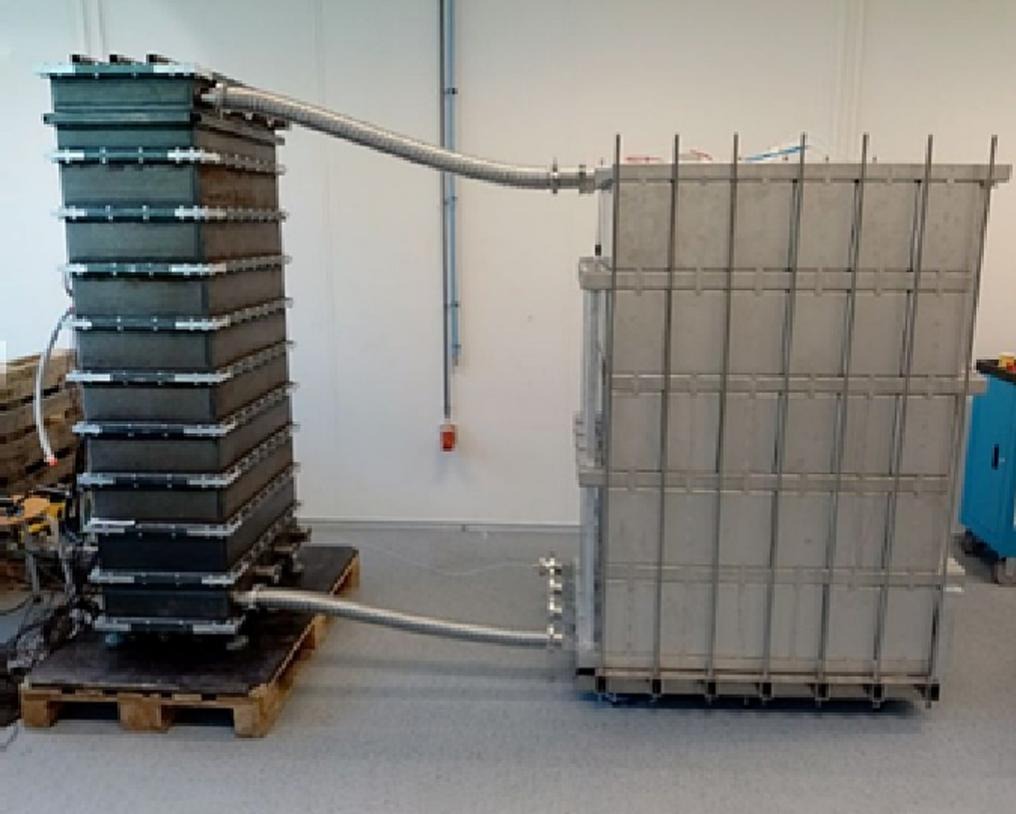A group of researchers led by the Eindhoven University of Technology in the Netherlands has developed a prototype of a solar-driven thermochemical storage system that stores thermal energy generated by solar thermal collectors.
The scientists said the novelty of their work consisted of utilizing a novel simulation-based methodology to study the behavior of the new system in a renovated dwelling with an air-source heat pump and no gas supply.
“The proposed methodology integrates building performance simulation and a data-driven surrogate model, enabling the optimization of system design based on specific building requirements and characteristics,” they explained. “The reduction of imported electricity is a proper indicator for assessing the value that the system can bring to the homeowner.”
The heat battery (HB) consists of a storage module based on potassium carbonate (K2CO3), which is one of the most promising thermochemical storage materials for built environment applications, and an electricity-driven mechanical system that maintains continuous charging or discharging powers.
In the charging mode, the heat battery receives the inlet temperature and mass flow rate of the charging fluid in the heat exchangers. At the same time, it adjusts the powers of the fan, the pump, and other components. In the discharging mode, the battery uses a similar set of input and output variables by calculating the outlet temperature of the corresponding fluid, the actual charging power, and the electric power.
“After the charging or discharging process completes, these components will be turned off to switch the heat battery into standby mode when its heat loss is negligible,” the scientists said.
Popular content
They assumed the heat battery to have a storage volume of 320 L or 93 kWh and the solar collectors to have a total surface of 8 m2. They also assumed the heat pump to have a nominal heating capacity of 12 kW and a rated coefficient of performance (COP) of 4.0. The house is located in Eindhoven and has an annual electricity consumption of 9 MWh.
Through the simulation, the group found that the novel battery is capable of “digesting” the thermal energy coming from the solar thermal collectors and reducing the dwelling's annual electricity consumption for heating by between 0.7 MWh to 1.0 MWh. It also found that increasing the storage volume of the battery may lead to reduced thermal comfort and that its optimal size should be between 80 L and 160 L.
“The result also suggests that it is not worthwhile to increase the storage volume for achieving seasonal storage in light of the limited space for both the heat battery and solar collectors in a detached house, especially when compared with the specific benefit of water tanks with the same storage volume,” the academics concluded. “All these results suggest that a small-scale HB could be more practical than a large-scale one in this type of daily-storage use case because of the efficient usage of both the storage capacity and charging/discharging powers.”
The system was presented in the study “A design optimization method for solar-driven thermochemical storage systems based on building performance simulation,” published in the Journal of Energy Storage. The research group also includes scientists from Netherlands-based heat battery company Cellcius B.V.
This content is protected by copyright and may not be reused. If you want to cooperate with us and would like to reuse some of our content, please contact: editors@pv-magazine.com.



1 comment
By submitting this form you agree to pv magazine using your data for the purposes of publishing your comment.
Your personal data will only be disclosed or otherwise transmitted to third parties for the purposes of spam filtering or if this is necessary for technical maintenance of the website. Any other transfer to third parties will not take place unless this is justified on the basis of applicable data protection regulations or if pv magazine is legally obliged to do so.
You may revoke this consent at any time with effect for the future, in which case your personal data will be deleted immediately. Otherwise, your data will be deleted if pv magazine has processed your request or the purpose of data storage is fulfilled.
Further information on data privacy can be found in our Data Protection Policy.